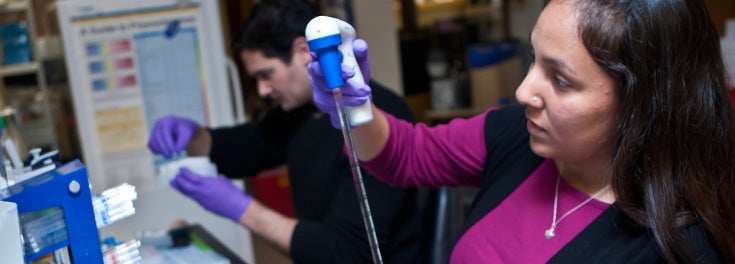
We call it I-Cubed, for short, and it stands for URI’s Institute for Immunology and Informatics. But more important than what it’s called, is what’s happening inside its labs at URI’s Providence-based Biotechnology Center. Research scientists from around the world, along with URI students, are developing new vaccines for “neglected” diseases affecting one billion people worldwide. You might know these diseases as malaria, dengue fever and Chagas disease.
“People are dying from horrible diseases – worm and bacterial and viral diseases – that no one has addressed because the people are very poor and the diseases aren’t affecting those of us who have great health care. We want to solve this problem by making sure that the people in the developing world have appropriate vaccines,” said I-Cubed Director and Co-founder Annie De Groot, who’s built a reputation for tuberculosis and HIV research.
Developing vaccines is a long, continuous process. When I’m not doing this work any more, today’s students will be the next generation making further innovations and new discoveries. ~Dr. Annie De Groot
Dengue fever is a debilitating, painful, mosquito-borne disease that affects 100 million people and causes 20,000 deaths each year. One of the world’s leading researchers on dengue, Research Professor Alan Rothman, joined the I-Cubed team at URI because “the people at the institute have very broad visions and there is something special about being in a place where there is incredible aspiration.”
He says the road to combatting dengue fever will be particularly difficult because it involves four different viruses, requiring four different vaccines, and because there are no animal models on which to test a vaccine for dengue fever, which means a lot more research and evidence is necessary before it can be deemed safe for humans.
His work is so important that it’s just been given a boost by two grants totaling $21 million from the National Institutes of Health for his work. The grants will support laboratory research in the U.S., Europe, and Asia, field studies and vaccine trials in Thailand and the Philippines, and expansion of the I-Cubed labs that will not only further his work on dengue fever research but enable I-Cubed to increase its capacity for basic immunology research on global health issues.
Vaccines may be the most effective medical intervention ever discovered, something that, given once, protects for life at very little cost. But as important as that work is, Professor De Groot says that training the next generation of vaccine scientists is equally important. “Developing vaccines is a long, continuous process. When I’m not doing this work any more, today’s students will be the next generation making further innovations and new discoveries.”
Maybe one day soon, you’ll be continuing the work Professors Rothman and De Groot have begun, improving the health of people around the globe.
Related Links:
Providence Journal article about one of Professor Rothman’s NIH grants
SFGate article about one of Professor Rothman’s NIH grants
Boston Globe article about Professor Rothman’s $10 million NIH grant
